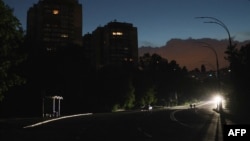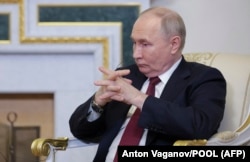Officials in southwestern Russia said Thursday that a Ukrainian drone attack ignited a fire at an oil refinery.
Vasily Golubev, the regional governor of the Rostov-on-Don region, said on Telegram that the attack hit the Novoshakhtinsk refinery and that work at the site was suspended.
In Russia's Belgorod region, Governor Vyacheslav Gladkov said a Ukrainian exploding drone hit an oil depot in Stary Oskol. Another drone attack damaged an agricultural business in Belgorod, Gladkov said.
Russia's Defense Ministry said Thursday it intercepted six Ukrainian drones over Belgorod, as well as 13 over Russia-occupied Crimea.
Ukraine's military reported Thursday downing 17 of 18 drones that Russia launched in overnight attacks.
The Ukrainian air force said the intercepts took place over the Kherson, Khmelnytskyi, Mykolaiv and Zaporizhzhia regions.
Serhii Tiurin, governor of the Khmelnytskyi region, reported damage to an infrastructure facility, but no injuries from the attack.
French President Emmanuel Macron said Thursday that France would be providing Ukraine with Mirage 2000-5 fighter jets. The Ukrainian pilots will be trained in France, he added in an interview on French TV.
Macron said the fighter jets would "allow Ukraine to protect is soil, its airspace" against Russian attacks.
"Peace," Macron said, "will only be achieved if Ukraine can resist. ... Peace cannot mean Ukraine's capitulation."
Russian President Vladimir Putin said Wednesday that Russia could use nuclear weapons if its sovereignty is threatened.
"If somebody's actions threaten our sovereignty and territorial integrity, we consider it possible to use all means at our disposal," Putin said, citing what he described as his country's security policy.
"For some reason, they believe in the West that Russia will never use it," Putin told a group of international journalists, adding that Russia's nuclear arsenal is much more powerful than what the United States used in Hiroshima and Nagasaki in Japan during World War II.
The Russian leader spoke on the sidelines of the annual St. Petersburg International Economic Forum.
Charles Kupchan, senior fellow and director of European Studies at the Council of Foreign Relations, told VOA, "I think what we've seen here is more rhetorical saber-rattling posturing by President Putin."
Putin also warned the United States and Germany that allowing Ukraine to fire long-range, Western-made weapons into Russia could prompt him to place similar Russian weapons in countries within range of the U.S. or its European allies.
"If they consider it possible to deliver such weapons to the combat zone to launch strikes on our territory and create problems for us, why don't we have the right to supply weapons of the same type to some regions of the world where they can be used to launch strikes on sensitive facilities of the countries that do it to Russia?" he said, according to The Associated Press.
Kupchan said, "I think that it's very unlikely that President Putin would either escalate to the nuclear level or begin to deploy Russian missiles in areas close to the United States or to Western Europe. I think we know from the 1960s Cuban missile crisis, when the Soviets were getting ready to deploy."
Germany joined the United States last week in authorizing Ukraine to hit targets on Russian soil along Ukraine's Kharkiv regional border using long-range weapons it supplied. Putin mentioned U.S. ATACMS as well as British and French missiles.
German tanks arriving in Ukraine surprised many in Russia, according to Putin, who said, "When German tanks first appeared on Ukrainian soil, it already produced such a moral, ethical shock in Russia, because relations toward [Germany] in Russian society had always been very good."
"Now, if they use missiles to strike facilities on the Russian territory it will completely ruin Russian-German relations," Putin said.
Asked about the upcoming U.S. election, the Russian leader said he is not concerned about the results.
"To say — I am speaking quite sincerely — that we believe that after the elections something will change toward Russia in American policy, I would not say so. We don't think so," said Putin. "We think that nothing really serious will happen."
Some information for this report came from The Associated Press, Reuters and Agence France-Presse. Kim Lewis contributed reporting.






